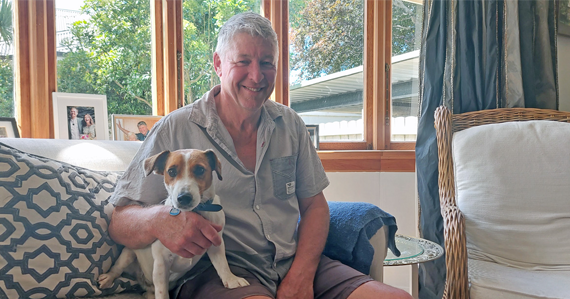-
-
Cr Andrew Noone
-
-
-
-
-
-
-
-
-
-
-
-
-


Third-term Councillor Andrew Noone grew up in East Otago and left school at 15 to go shearing. “I can still shear a sheep, but you’ll notice I don’t say I can shear ‘sheep’, plural,” he says.
Shearing taught him everything he knows about teamwork. “It’s all about relying on each other and working collaboratively.”
Jumping the ditch to drive tractors in Aussie, he returned to settle down back on the farm in the early ʼ80s, marrying Chele, a nurse and farmer’s daughter from the Maniototo. Three children and two grandchildren later, son Zac is the third generation Noone on the family farm, 900 hectares located a few kilometres inland from Karitane. Arrival of grandson George means there could well be a fourth … no pressure, George!
Having been a sheep and beef farmer for over 30 years now — gumboots planted firmly on the ground — Andrew’s a little bit country, a little bit city — bridging the two, not that there’s any real divide. “You’re always closer to your opposite number than you realise – you just have to listen.”
To really know a place, you need to walk it, Andrew says. Get your boots on the ground. Jack Russell Ernie and he once walked the length of the Manuherekia. “He does his own environmental inspections.”
“I love walking. It’s good for the mind, soul, and the best way to understand the lie of the land. As an elected member, I feel that’s your duty. Get out there, be better informed, be approachable. We’re elected in our wards, but it’s really important you lift yourself out of that — our community is the whole region. Otago is unique in terms of the challenges the regional council faces. We have all seasons and all landscapes: dry, rocky terrain; wetlands; mountains; coast; rivers; lakes — we really have it all here. There’s Queenstown, which has seen massive growth, as has Wānaka, the alpine lakes, Central Otago — which is more like northern Italy in some places — and then the coastal areas, Waitaki, Dunedin and Clutha. Makes for a diverse mix of activities and climates, and the needs of the population are wildly different in each area. The pressure from developers in places like Queenstown is massive as more and more people want to live there. Little ol’ Dunedin is truckin’ along, even though it looks like there’s nothing but roadworks everywhere at the moment — and these growing pains create pressure for regional councils. We also need to be mindful of natural hazards, ensuring communities are well informed about risks.”
“A council is also unique in that it brings together a group that probably wouldn’t come together for anything else. This is a real blessing — you get a diverse range of opinions and perspectives that better reflect the region we represent.”
Andrew brings excellent knowledge of the RMA as an RMA commissioner and previous local government experience as a Dunedin City Councillor. Unflappable, a straight shooter, this isn’t his first rodeo. “I’ve been around for a while. Finishing up at the DCC, I felt I still had something to contribute, which is why I stood for ORC.”
Biggest challenge facing the ORC? “To my mind, there are three: to meet current timeframes for the land and water plan; providing a public transport system that’s convenient, reliable, affordable and accessible; and the capacity and capability of the organisation. We’ve had to come up to speed and be fit for purpose, and we’re still trying to recruit to fulfil the commitments of our work programme in a very competitive employment market.”
“However, the knowledge we have now when it comes to science, compared to a decade ago … we’ve come a long way. In more recent times, the council has become more responsive and better at engaging with the public — those qualities build trust. If we say we’re going to do something, then we are going to do it.”
